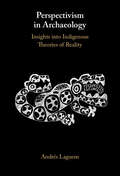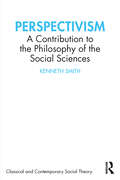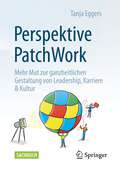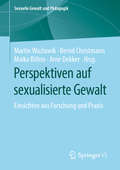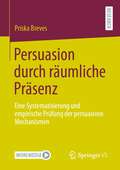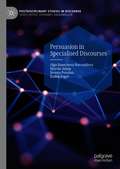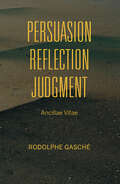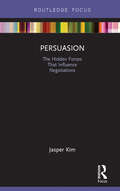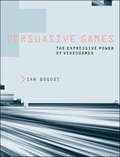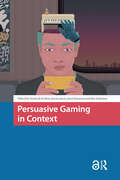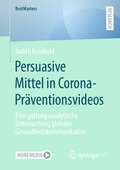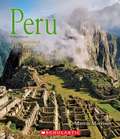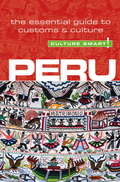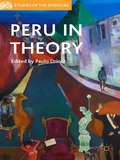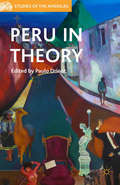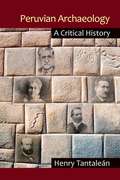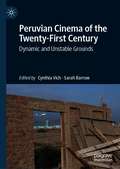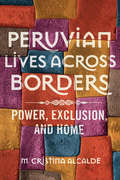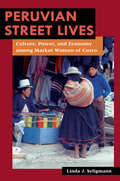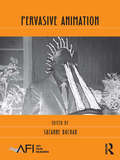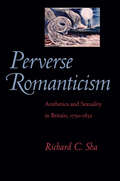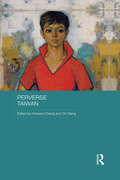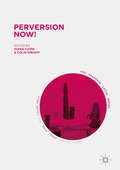- Table View
- List View
Perspectivism in Archaeology: Insights into Indigenous Theories of Reality
by Andrés LaguensPerspectivism in Archaeology explores recurring features in Amerindian mythology and cosmology in the past, as well as distinctions and similarities between humans, non-humans and material culture. It offers a range of possibilities for the reconstruction of ancient ontological approaches, as well as new ways of thinking in archaeology, notably how ancient ontological approaches can be reconciled with current archaeological theories. In this volume, Andrés Laguens contributes a new set of approaches that incorporate Indigenous theories of reality into an understanding of the South American archaeological record. He analyses perspectivism as a step-by-step theory with clear explanations and examples and shows how it can be implemented in archaeological research and merged with ontological approaches. Exploring the foundations of Amerindian perspectivism and its theoretical and methodological possibilities, he also demonstrates applications of its precepts through case studies of ancient societies of the Andes and Patagonia.
Perspectivism: A Contribution to the Philosophy of the Social Sciences (Classical and Contemporary Social Theory)
by Kenneth SmithPerspectivism: A Contribution to the Philosophy of the Social Sciences advances the philosophy of perspectivism, showing how its capacity to assess competing views of a particular concept by approaching them as different ‘sides’ of a multi-dimensional object supports a concept of ‘adequate’ rather than ‘absolute’ truth. Presenting four case studies – of the social scientific concepts of power, equality, crime, and sex and gender – Smith demonstrates the manner in which the perspectivist approach does not take all differing views of a concept to be equally good, but views all perspectives taken together as contributing towards the best that we can know about any given concept at the present time. An exposition and analysis of the means by which perspectivism allows for truth and objectivity in the social sciences, this volume will appeal to scholars of philosophy and across the social sciences with interests in questions of epistemology and research methodology.
Perspektive Patchwork: Mehr Mut zur ganzheitlichen Gestaltung von Leadership, Karriere & Kultur
by Tanja EggersDieses Buch macht Mut zum Perspektivwechsel: Patchwork ist mehr als Familie, Patchwork ist ein Lebensentwurf, der sich in Gesellschaft, Kultur und folglich auch in der Arbeitswelt widerspiegelt. Es geht um ganzheitliche Lebensmodelle, um die Verbindung von Privat- und Berufsleben, um den persönlichen roten Faden. Tanja Eggers, erfahrene Managerin und selbst Patchworkerin, zeigt einen vielfältigen Mix an Praxis-Impulsen zu Leadership, Organisationsentwicklung, Lernkultur und Karrieregestaltung im Patchwork-Style auf und bietet Expert:innen zu New Work und New Leadership Raum, um diverse Welten zu verbinden.Durch persönliche Einblicke sowohl in die eigene Patchwork-Situation als auch in den Umgang mit einem Schicksalsschlag im engsten Umfeld zeigt sie auf, wie wichtig es ist, achtsam mit sich und anderen zu sein, um selbst wieder ins Gestalten zu kommen. Skills wie Kreativität, Flexibilität und Mut im Umgang mit Veränderungen sind gefragt, denn das Leben ist selten linear. Es gelingt ihr, intensive und inspirierende Mutmacher-Impulse zu setzen. Reflexionsfragen bieten einen Ankerplatz für eigene Erkenntnisse – auf dem individuellen Weg, auf der persönlichen Lernreise. Anders, vielfältig, bunt – einfach Patchwork.
Perspektiven auf sexualisierte Gewalt: Einsichten aus Forschung und Praxis (Sexuelle Gewalt und Pädagogik #5)
by Martin Wazlawik Arne Dekker Bernd Christmann Maika BöhmIn diesem Buch wird eine Auswahl praxisrelevanter Forschungsergebnisse präsentiert und gleichermaßen erhalten hier pädagogische Einrichtungen die Möglichkeit, ihren Erfahrungsschatz einer größeren Fachöffentlichkeit zu präsentieren. Es wird deutlich, wie sehr eine eigenständige Wissenschaftslandschaft zur Thematik „Sexualisierte Gewalt in pädagogischen Kontexten und Institutionen“ in den vergangenen Jahren an Kontur gewonnen hat.
Persuasion In The Media Age
by Timothy A. BorchersPersuasion is omnipresent in todays media-saturated society. From politicians to advertisers to friends and colleagues, persuaders are using increasingly sophisticated strategies to influence our attitudes, beliefs, and behaviors. Fortunately, this updated edition of Persuasion in the Media Age provides a timely, solid understanding of the methods used by contemporary persuaders and offers strategies to help readers become critical consumers of persuasion. <p><p> Borchers begins with the premise that contemporary culture has been forever changed by electronic media and explores the way media technologies have influenced the study and practice of persuasion. He draws from a wide variety of scholars, bringing together the latest perspectives and research as well as foundational concepts.The Third Edition spotlights the influence of social media, presents storytelling as a key driver for persuasion, and incorporates updated examples that reflect recent political campaigns and developments in popular culture. <p> This pedagogically rich, illustrated volume includes learning objectives, key terms, discussion questions, and activities that encourage students to apply chapter content to their everyday experiences. Internet-based exercises provide practical, relevant opportunities for students to evaluate Web-based persuasion, while ethics cases explore compelling issues that have emerged in todays media-dominated environment.
Persuasion durch räumliche Präsenz: Eine Systematisierung und empirische Prüfung der persuasiven Mechanismen
by Priska BrevesDie persuasive Wirksamkeit immersiver Botschaften wurde schon mehrfach empirisch nachgewiesen. Die räumliche Präsenz wurde dabei als Mediator der Effekte identifiziert – wie genau dieser Persuasionsmechanismus allerdings abläuft, ist bisher ungeklärt. Daher wird die bisherige Forschung rund um die Wahrnehmung der räumlichen Präsenz in diesem Buch aufgearbeitet und systematisiert. Unterschiedliche Ansätze und Theorien werden dabei miteinander in Verbindung gesetzt und die Vermutungen anhand von drei empirischen Laborexperimente geprüft. Die Ergebnisse werden im Anschluss durch ein konzeptuelles Persuasionsmodell miteinander verbunden und ausführlich diskutiert.
Persuasion in Specialised Discourses (Postdisciplinary Studies in Discourse)
by Olga Dontcheva-Navratilova Martin Adam Renata Povolná Radek VogelThis book examines the concept of persuasion in written texts for specialist audiences in the English and Czech languages. By exploring a corpus of academic research articles, corporate reports, religious sermons and user manuals the authors aim to reveal similarities and differences in rhetorical strategies across cultures and genres. They draw on Biber and Conrad’s (2009) model for contextualising interaction in specialised discourses, Bell’s (1997) framework for the analysis of participants roles, Swales’ (1990) genre analysis approach for considering genre constraints and Hyland’s (2005) metadiscourse model for investigating writer-reader interaction. The result is a book which will appeal to researchers and students in Discourse Studies, especially those with an interest in genre and rhetorical strategies.
Persuasion, Reflection, Judgment: Ancillae Vitae (Studies in Continental Thought)
by Rodolphe GaschéGasché expounds on Aristotle, Heidegger, and Arendt in “a major interpretative achievement that underscores what is at stake in political thought” (Notre Dame Philosophical Reviews).As one of the most respected voices of Continental philosophy today, Rodolphe Gasché pulls together Aristotle’s conception of rhetoric, Martin Heidegger’s debate with theory, and Hannah Arendt’s conception of judgment in a single work on the centrality of these themes as fundamental to human flourishing in public and political life. Gasché’s readings address the distinctively human space of the public square and the actions that occur there, and his valorization of persuasion, reflection, and judgment reveals new insight into how the philosophical tradition distinguishes thinking from other faculties of the human mind.“Here Rodolphe Gasche is at his best: rigorous, scholarly, creative, forceful, laser focused on the issues at stake, learned, thoughtful, and original. He demands much of his readers, but reading his work is rewarding in ways that can be profoundly affecting.” —Dennis J. Schmidt, author of Between Word and Image“Rodolphe Gasche has long been one of the most meticulous readers of texts on the philosophical scene and here he once again offers a master class in how to do philosophy through interpretation.” —Robert Bernasconi, author of How to Read Sartre
Persuasion: The Hidden Forces That Influence Negotiations (Routledge Focus on Business and Management)
by Jasper KimPersuasion: The Hidden Forces That Influence Negotiations represents the first book of its kind to package and present persuasion principles in an innovative, international, and interdisciplinary fashion. This easy-to-understand book is the culmination of seminal research findings spanning across decades and disciplines – psychology, philosophy, negotiations, decision-making, logic, law, and economics, among others – from esteemed experts around the world. Persuasion provides a series of short, simple-to-use intellectual tools to go above and beyond merely describing "what to think"– but "how to think" in a persuasion, influence, and negotiation context –across a diverse array of disciplines, sectors, and situations from boardrooms to classrooms for the twenty-first century.
Persuasive Games: The Expressive Power of Videogames
by Ian BogostAn exploration of the way videogames mount arguments and make expressive statements about the world that analyzes their unique persuasive power in terms of their computational properties. Videogames are an expressive medium, and a persuasive medium; they represent how real and imagined systems work, and they invite players to interact with those systems and form judgments about them. In this innovative analysis, Ian Bogost examines the way videogames mount arguments and influence players. Drawing on the 2,500-year history of rhetoric, the study of persuasive expression, Bogost analyzes rhetoric's unique function in software in general and videogames in particular. The field of media studies already analyzes visual rhetoric, the art of using imagery and visual representation persuasively. Bogost argues that videogames, thanks to their basic representational mode of procedurality (rule-based representations and interactions), open a new domain for persuasion; they realize a new form of rhetoric. Bogost calls this new form "procedural rhetoric," a type of rhetoric tied to the core affordances of computers: running processes and executing rule-based symbolic manipulation. He argues further that videogames have a unique persuasive power that goes beyond other forms of computational persuasion. Not only can videogames support existing social and cultural positions, but they can also disrupt and change these positions themselves, leading to potentially significant long-term social change. Bogost looks at three areas in which videogame persuasion has already taken form and shows considerable potential: politics, advertising, and learning.
Persuasive Gaming in Context (Games and Play)
by Ben Schouten Joost Raessens Teresa de la Hera Jeroen JanszThe rapid developments in new communication technologies have facilitated the popularization of digital games, which has translated into an exponential growth of the game industry in recent decades. The ubiquitous presence of digital games has resulted in an expansion of the applications of these games from mere entertainment purposes to a great variety of serious purposes. In this edited volume, we narrow the scope of attention by focusing on what game theorist Ian Bogost has called 'persuasive games', that is, gaming practices that combine the dissemination of information with attempts to engage players in particular attitudes and behaviors. This volume offers a multifaceted reflection on persuasive gaming, that is, on the process of these particular games being played by players. The purpose is to better understand when and how digital games can be used for persuasion by further exploring persuasive games and some other kinds of persuasive playful interaction as well. The book critically integrates what has been accomplished in separate research traditions to offer a multidisciplinary approach to understanding persuasive gaming that is closely linked to developments in the industry by including the exploration of relevant case studies.
Persuasive Mittel in Corona-Präventionsvideos: Eine gattungsanalytische Untersuchung globaler Gesundheitskommunikation (BestMasters)
by Judith ReinboldIn diesem Buch werden 199 Videoclips, in denen Gesundheitsbehörden aus 17 Ländern Corona-Präventionsmaßnahmen nahelegen auf persuasive und gestalterische Mittel hin untersucht. . In einer soziologischen, qualitativ orientierten Medienproduktanalyse kristallisieren sich vier wesentliche inhaltliche Überzeugungsmittel heraus, nämlich sachliche Informationen, soziale Einflüsse, Zukunftsszenarien und Furchtappelle. Im Rahmen einer Gattungsanalyse werden diese als variable Merkmale der Binnenstruktur erfasst, die auf eine neu entstehende kommunikative Gattung bzw. Form (Corona-Präventionsvideos) hindeuten.
Peru (Enchantment of the World, Second Ser.)
by Marion MorrisonDescribes the geography, plants and animals, history, economy, language, sports and arts, religions, culture, and people of South America's third largest republic.
Peru - Culture Smart!
by John ForrestCulture Smart! provides essential information on attitudes, beliefs and behavior in different countries, ensuring that you arrive at your destination aware of basic manners, common courtesies, and sensitive issues. These concise guides tell you what to expect, how to behave, and how to establish a rapport with your hosts. This inside knowledge will enable you to steer clear of embarrassing gaffes and mistakes, feel confident in unfamiliar situations, and develop trust, friendships, and successful business relationships.Culture Smart! offers illuminating insights into the culture and society of a particular country. It will help you to turn your visit-whether on business or for pleasure-into a memorable and enriching experience. Contents include* customs, values, and traditions* historical, religious, and political background* life at home* leisure, social, and cultural life* eating and drinking* do's, don'ts, and taboos* business practices* communication, spoken and unspoken"Culture Smart has come to the rescue of hapless travellers." Sunday Times Travel"... the perfect introduction to the weird, wonderful and downright odd quirks and customs of various countries." Global Travel"...full of fascinating-as well as common-sense-tips to help you avoid embarrassing faux pas." Observer"...as useful as they are entertaining." Easyjet Magazine"...offer glimpses into the psyche of a faraway world." New York TimesFrom the Trade Paperback edition.
Peru in Theory (Studies of the Americas)
by Paulo DrinotCan 'theory' teach us anything about Peru? Can 'Peru' teach us anything about theory? The chapters in this volume explore these questions by establishing a productive dialogue between Peru and theory. Focusing on institutional weakness and economic, social, gendered, racialized, and other forms of exclusion key issues in recent social scientific inquiry in Peru - the contributors to this volume assess the extent to which the analytical frameworks of a number of social and cultural theorists can inform, and, at the same time, be informed by, Peru as a case study.
Peruvian Archaeology: A Critical History
by Henry TantaleánThis book offers a unique, critical perspective on the history of Peruvian archaeology by a native scholar. Leading Peruvian archaeologist Henry Tantaleán illuminates the cultural legacy of colonialism beginning with “founding father” Max Uhle and traces key developments to the present. These include the growth of Peruvian institutions; major figures from Tello and Valcárcel to Larco, Rowe, and Murra; war, political upheaval, and Peruvian regimes; developments in archaeological and social science theory as they impacted Andean archaeology; and modern concerns such as heritage, neoliberalism, and privatization. This post-colonial perspective on research and its sociopolitical context is an essential contribution to Andean archaeology and the growing international dialogue on the history of archaeology.
Peruvian Cinema of the Twenty-First Century: Dynamic and Unstable Grounds
by Sarah Barrow Cynthia VichThis is the first English-language book to provide a critical panorama of the last twenty years of Peruvian cinema. Through analysis of the nation’s diverse modes of filmmaking, it offers an insight into how global debates around cinema are played out on and off screen in a distinctive national context.The insertion of post-conflict Peru within neoliberalism resulted in widespread commodification of all areas of life, significantly impacting cinema culture. Consequently, the principal structural concept of this collection is the interplay between film production and market forces, an interaction which makes dynamism and instability the defining features of 21st-century Peruvian cinema.
Peruvian Lives across Borders: Power, Exclusion, and Home
by M. Cristina AlcaldeIn Peruvian Lives across Borders, M. Cristina Alcalde examines the evolution of belonging and the making of home among middle- and upper-class Peruvians in Peru, the United States, Canada, and Germany. Alcalde draws on interviews, surveys, participant observation, and textual analysis to argue that to belong is to exclude. To that end, transnational Peruvians engage in both subtle and direct policing along the borders of belonging. These acts allow them to claim and maintain the social status they enjoyed in their homeland even as they profess their openness and tolerance. Alcalde details these processes and their origins in Peru's gender, racial, and class hierarchies. As she shows, the idea of return--whether desired or rejected, imagined or physical--spurs constructions of Peruvianness, belonging, and home. Deeply researched and theoretically daring, Peruvian Lives across Borders answers fascinating questions about an understudied group of migrants.
Peruvian Street Lives: Culture, Power, and Economy among Market Women of Cuzco (Interp Culture New Millennium)
by Linda J. SeligmannFor more than twenty years, Linda J. Seligmann walked the streets of Peru in city and countryside alike, talking to the women who work in the informal and open-air markets in Cuzco's Andean highlands. Her combination of ethnographic analysis, insightful and human vignettes, and superb photographs offers a humane yet incisive portrait of the women's lives against the backdrop of globalization and other powerful forces. In Peruvian Street Lives, Seligmann argues that the sometimes invisible and informal economic, social, and political networks market women establish may appear disorderly and chaotic, but in fact often keep dysfunctional economies and corrupt bureaucracies from utterly destroying the ability of citizens to survive from day to day. Seligmann asks why the constructive efforts of market women to make a living provoke such negative social perceptions from some members of Peruvian society, who see them as symbols and actual catalysts of social disorder. At the same time, Seligmann shows how market women eke out a living, combat discrimination, and transgress racial and gender ideologies within the rich and expressive cultural traditions they have developed.
Pervasive Animation (AFI Film Readers)
by Suzanne BuchanThis new addition to the AFI Film Readers series brings together original scholarship on animation in contemporary moving image culture, from classic experimental and independent shorts to digital animation and installation. The collection - that is also a philosophy of animation - foregrounds new critical perspectives on animation, connects them to historical and contemporary philosophical and theoretical contexts and production practice, and expands the existing canon. Throughout, contributors offer an interdisciplinary roadmap of new directions in film and animation studies, discussing animation in relationship to aesthetics, ideology, philosophy, historiography, visualization, genealogies, spectatorship, representation, technologies, and material culture.
Perverse Romanticism: Aesthetics and Sexuality in Britain, 1750–1832
by Richard C. ShaRichard C. Sha’s revealing study considers how science shaped notions of sexuality, reproduction, and gender in the Romantic period. Through careful and imaginative readings of various scientific texts, the philosophy of Immanuel Kant and Longinus, and the works of such writers as William Blake, Percy Bysshe Shelley, Mary Wollstonecraft, and Lord Byron, Sha explores the influence of contemporary aesthetics and biology on literary Romanticism. Revealing that ideas of sexuality during the Romantic era were much more fluid and undecided than they are often characterized in the existing scholarship, Sha’s innovative study complicates received claims concerning the shift from perversity to perversion in the nineteenth century. He observes that the questions of perversity—or purposelessness—became simultaneously critical in Kantian aesthetics, biological functionalism, and Romantic ideas of private and public sexuality. The Romantics, then, sought to reconceptualize sexual pleasure as deriving from mutuality rather than from the biological purpose of reproduction.At the nexus of Kantian aesthetics, literary analysis, and the history of medicine, Perverse Romanticism makes an important contribution to the study of sexuality in the long eighteenth century.
Perverse Spectators: The Practices of Film Reception
by Janet StaigerFilm and television have never been more prevalent or watched than they are now, yet we still have little understanding of how people process and make use of what they see. And though we acknowledge the enormous role the media plays in our culture, we have only a vague sense of how it actually influences our attitudes and desires. In Perverse Spectators, Janet Staiger argues that studying the interpretive methods of spectators within their historical contexts is both possible and necessary to understand the role media plays in culture and in our personal lives. This analytical approach is applied to topics such as depictions of violence, the role of ratings codes, the horror and suspense genre, historical accuracy in film, and sexual identities, and then demonstrated through works like JFK, The Silence of the Lambs, The Texas Chain Saw Massacre, Psycho, and A Clockwork Orange. Each chapter shows a different approach to reconstructing audience responses to films, consistently and ingeniously finding traces of what would otherwise appear to be unrecoverable information. Using vivid examples, charting key concepts, and offering useful syntheses of long-standing debates, Perverse Spectators constitutes a compelling case for a reconsideration of the assumptions about film reception which underlie contemporary scholarship in media studies. Taking on widely influential theories and scholars, Perverse Spectators is certain to spark controversy and help redefine the study of film as it enters the new millennium.
Perverse Taiwan (Routledge Research on Gender in Asia Series)
by Howard Chiang Yin WangHost of the first gay pride in the Sinophone world, Taiwan is well-known for its mushrooming of liberal attitudes towards non-normative genders and sexualities after the lifting of Martial Law in 1987. Perverse Taiwan is the first collection of its kind to contextualize that development from an interdisciplinary perspective, focusing on its genealogical roots, sociological manifestations, and cultural representations. This book enriches and reorients our understanding of postcolonial queer East Asia. Challenging a heteronormative understanding of Taiwan’s past and present, it provides fresh critical analyses of a range of topics from queer criminality and literature in the 1950s and 1960s to the growing popularity of cross-dressing performance and tongzhi (gay and lesbian) cinema on the cusp of a new millennium. Together, the contributions provide a detailed account of the rise and transformations of queer cultures in post-World War II Taiwan. By instigating new dialogues across disciplinary divides, this book will have broad appeal to students and scholars of Asian studies and queer studies, especially those interested in history, anthropology, literature, film, media, and performance.
Perversion Now!
by Diana Caine Colin WrightThis book enabling practicing analysts from around the world to interrogate the contemporary relevance of Lacanian theory for a category at once formative and deeply problematic for psychoanalysis: perversion.
